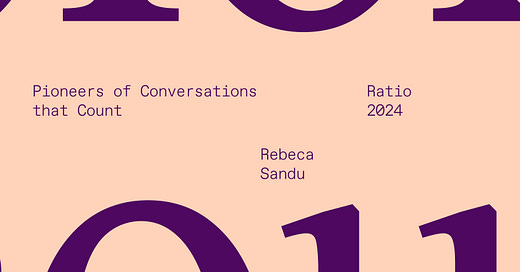Pioneers of Conversations that Count
I am due to meet a group of women, all Mums who come together with their kids to find some time for them and relax. When I enter the room, I see around 20 women and their respective 20 children. The youngest is a few months old. It's absolute chaos, and I need to carve some space and time to talk to them about Conversations that Count.
We gather around the table where lunch is laid out. I start by asking them for stories of people in their lives. Everyone has something to say. The daughter who smiles at you; the mother who is always there; the hospital nurse who helped you when you needed it the most. It’s easy to talk about relationships.
I introduce the idea of Conversations that Count to the women. While I speak, this little one year old baby girl is staring at me, listening so intensely I think she must really understand me when I say: Conversations that Count is a contact number that sits on your WhatsApp; it asks you daily who have you met that day; it gives you regular feedback on your social connection, which can prompt you to have further face to face conversations in the community about the people in your life. This baby girl seems to get it.
The women are interested. They ask me sharp questions.
• What happens to my data? If Conversations that Count sits on my WhatsApp then it has my phone number. Who else has access to my number and my data?
• Is this a research project? No, I respond. Primarily, it's a way to start a national conversation about relationships. But yes, there will some ways in which this data can help us understand social connection, and inform our thinking of how to build communities that encourage connection between people. That's a secondary goal though.
• If I don't meet people every day, is that a problem? This woman was concerned about not being able to provide us with, in her words, ‘amazing’ answers (she was new to the area so there were days when she would not see many people) so almost decided not to opt in. It made me think about all the negative influences of the way in which we have made people complicit in this gamification of data, help, and money. You, as a user of welfare services, need to give me, the organisation supporting you, data about you so I can, in turn, justify the need for this service to others who have money. She decided to participate.
• How will this fit with my routine? So much of what we create and innovate asks the user to adapt, to do something strange for them, like filling a survey, commonplace in our jobs but not how people go about their lives. This woman says that Conversations that Count needs to fit in with how she lives her life, not the other way around.
We set up a WhatsApp group and we decide to start on 1st of March testing for three months Conversations that Count. We are off.
The objective is to build an approach and movement not dependent on organisations, that can be owned by the people taking part in the conversations. We formed a partnership with two organisations -Community Resources in Barking and Dagenham and Pembroke House in South London- that respect the breadth and power of civil society to explore how might we achieve this objective.




